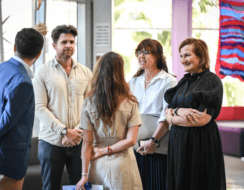24 Mar 2017
NewsBusinesses and jobs created by SSI’s Ignite Small Business Start-ups
Magician Hamid Ariento and his assistant at Claire Aarabella Parliament House.
The final evaluation report of Ignite by UTS Business School Professor Jock Collins – From Refugee to Entrepreneur in Three Years – was launched by Assistant Minister for Industry, Innovation and Science the Hon Craig Laundy MP on Thursday, March 23.
The night before, at the Australian Migration Settlement Awards, SSI won the Settlement Innovation category, with Ignite being a significant component of the nomination.
Ignite facilitates business creation for people from refugee backgrounds who are keen to establish a small business or expand an existing one.
The study found that 68% of refugee graduates of Ignite Small Business Start-ups had moved off Centrelink payments, with some also paying company tax and generating jobs for others.
Ignite evaluation report key findings
- In-depth interviews with 35 of the refugee entrepreneurs identified savings of $880,000 a year in Centrelink benefits – or a potential $4.4 million over five years – among this group alone.
- More than 60 new refugee enterprises emerged from the program, generating company tax revenue for the government.
- At the time of the study, 20 staff had been taken on by the program’s entrepreneurs.
- The entrepreneurs were also contributing to innovation in Australia.

Assistant Minister for Industry, Innovation and Science Craig Laundy MP, SSI CEO Violet Roumeliotis and SSI General Manager Peter Zographakis.
SSI CEO Violet Roumeliotis said it was not because of a lack of passion, a business idea or commitment and ability that other Ignite clients had not set up a business.
“Rather, the constraint was the time of the enterprise facilitators. With more resources for the program to hire additional enterprise facilitators the success rate would have been much higher,” she said.
Although the launch was about the success that the Ignite model has proven to be, Ms Roumeliotis said it was also about celebrating the determination and passion of a special group of people who began a new life in this country, and today call themselves entrepreneurs.
“The Ignite initiative has always been close to my heart because it demonstrates what many of us in the settlement sector know first-hand – that humanitarian refugees bring a wealth of skill and experience in entrepreneurship to Australia, and that with support they can contribute their know-how and skills, paying dividends to the economy.”
Overall, of the 240 SSI refugee clients accepted into the Ignite program, 25 per cent were now running their own enterprise, the study found – an admirable success rate considering the substantial barriers refugees faced, Professor Collins said.
“At first glance refugees are the most unlikely entrepreneurs. They lack capital to start up a business, they have no credit history, no assets or security. In many instances their educational qualifications are not recognised and they have no social networks,” he said.
The event commenced with a magic and illusion performance by Hamid Ariento, one of Ignites most recent entrepreneurs.

SSI CEO Violet Roumeliotis speaking about Ignite at Parliament House.
Mr Ariento came to Australia in 2013, seeking refuge rom Iran, and was supported by SSI on arrival.
At 15 years of age, Mr Ariento was allowed to start learning how to do magic tricks as long as he kept up with his studies.
Within two years he was a professional, doing shows for television and performing in Iran, Malaysia, Singapore and for the Queen of Belgium.
“What I like the most about being a magician is the expression of surprise in the faces of the people attending my shows when a trick impresses them,” He said.
Ignite has assisted Mr Ariento with a business and marketing plan, logo design, business cards and exposure for more shows.
“Magic is like an international language, an international art – basic magic tricks are the same here and in Iran,” Mr Ariento said.

Magician’s assistant Claire Aarabella, SSI CEO Violet Roumeliotis, Ariento the Magician, and Innes Willox, CEO of the Australian Industry Group.
Most of the participants that took part in the evaluation came from Iran (87), Iraq (34) and Syria (23), though refugees from 30 countries and 27 different first languages have been supported by Ignite.
Professor Collins said there was international interest in the Ignite program, given the unprecedented movement of refugees in the past few years.
“New innovative solutions to the challenges of refugee economic engagement and settlement need to be made,” he said. “The Ignite start-ups initiative is evidence-based policy innovation that can be applied across Australia and refugee resettlement nations across the world.”
Given the success of Ignite, Ms Roumeliotis announced at the launch that SSI will be tailoring the model to address barriers and meet the specific needs of entrepreneurs with disability through the new IgniteAbility Small Business Start-ups initiative.
“Through a new program called Ignite Ability, Ignite facilitators will provide an ecosystem of support for aspiring entrepreneurs with disability, their families and their carers,” Ms Roumeliotis said.


